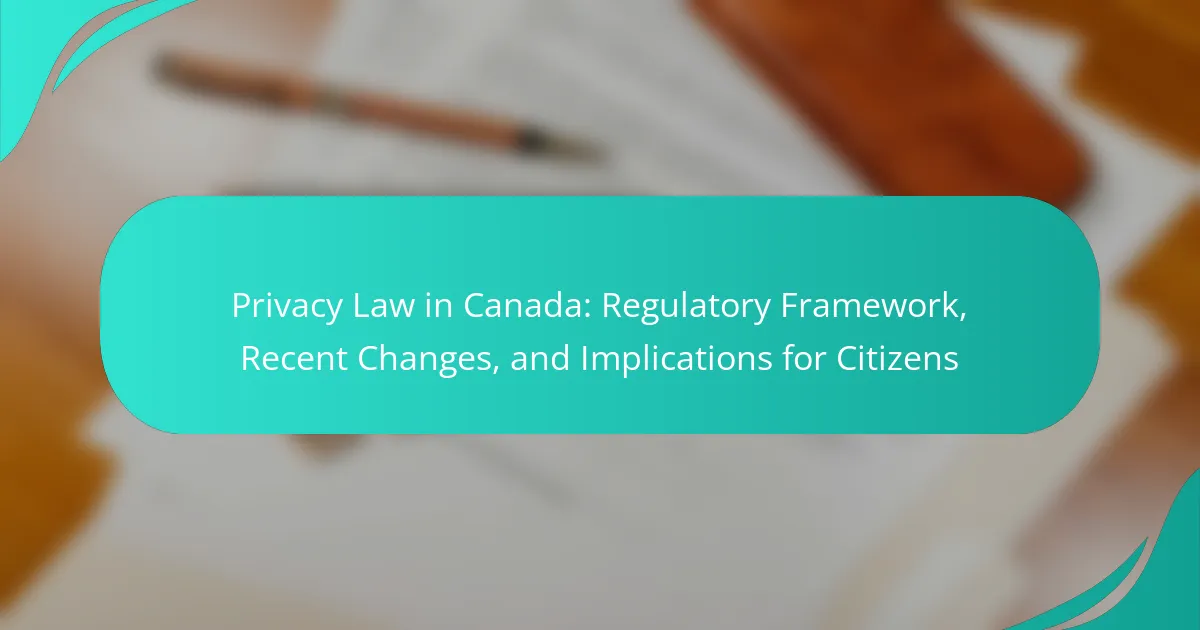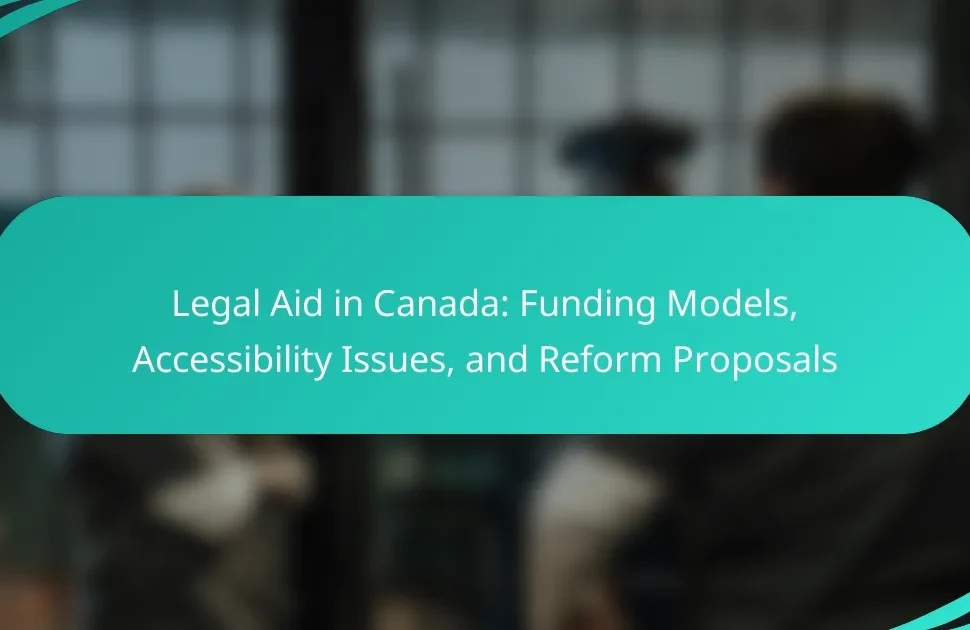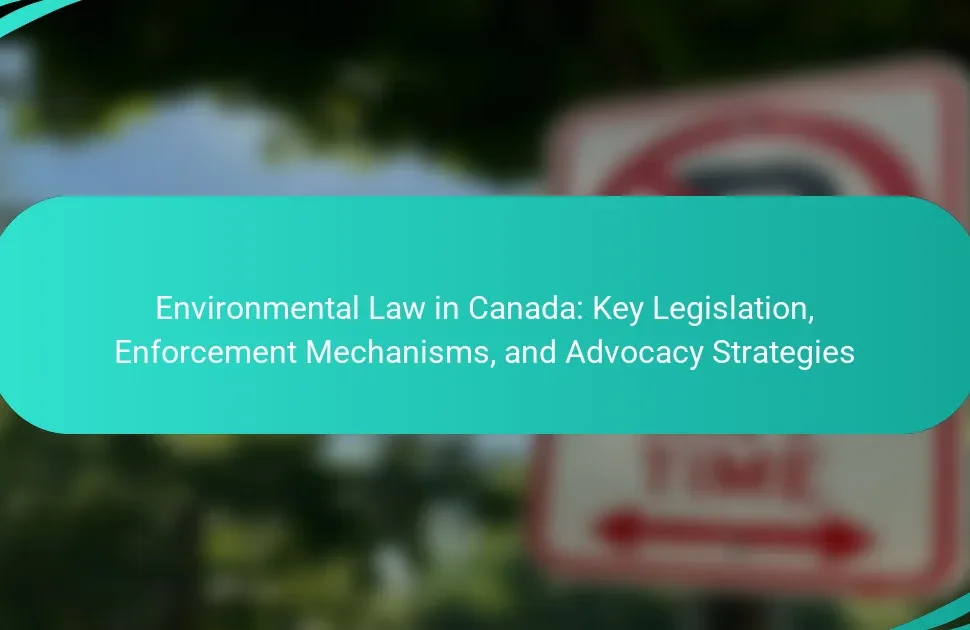
What is Privacy Law in Canada?
Privacy law in Canada encompasses regulations that protect personal information. It aims to govern how organizations collect, use, and disclose personal data. The main legislation includes the Personal Information Protection and Electronic Documents Act (PIPEDA). PIPEDA applies to private-sector organizations in Canada. It establishes standards for consent, data security, and individual rights. Additionally, provincial laws may also apply in certain jurisdictions. The Office of the Privacy Commissioner of Canada oversees compliance with these laws. This legal framework is crucial for safeguarding citizens’ privacy rights in a digital age.
How is Privacy Law defined in the Canadian context?
Privacy law in Canada is defined by a combination of federal and provincial statutes. Key legislation includes the Personal Information Protection and Electronic Documents Act (PIPEDA). PIPEDA governs how private sector organizations collect, use, and disclose personal information. It applies to organizations engaged in commercial activities across Canada. Additionally, provincial laws may provide further privacy protections, such as the Personal Health Information Protection Act in Ontario. The Office of the Privacy Commissioner of Canada oversees compliance with these laws. Privacy law in Canada is designed to protect individuals’ personal information while balancing the needs of organizations.
What are the key principles underlying Privacy Law in Canada?
The key principles underlying Privacy Law in Canada include consent, purpose limitation, and data minimization. Consent requires organizations to obtain permission from individuals before collecting their personal information. Purpose limitation mandates that data collection must be for specific, legitimate purposes. Data minimization emphasizes that only the necessary information should be collected for the intended purpose. These principles are enshrined in laws such as the Personal Information Protection and Electronic Documents Act (PIPEDA). PIPEDA governs how private sector organizations handle personal data. It reflects Canada’s commitment to protecting individual privacy rights.
How does Privacy Law in Canada compare to other countries?
Privacy law in Canada emphasizes consent and transparency, similar to the European Union’s GDPR. Canada’s Personal Information Protection and Electronic Documents Act (PIPEDA) governs private sector data protection. In comparison, the United States lacks a comprehensive federal privacy law, relying instead on sector-specific regulations. Countries like Australia have similar frameworks to Canada, focusing on individual rights and data protection. Notably, Canada’s privacy laws are considered to be less stringent than those in the EU but more robust than in the U.S. This positioning reflects Canada’s commitment to privacy while balancing business interests.
What entities are governed by Privacy Law in Canada?
Privacy law in Canada governs various entities. These include federal government institutions and private sector organizations. Provincial governments also have their own privacy laws. Non-profit organizations and charities fall under specific regulations. Health care providers are subject to privacy rules regarding patient information. Educational institutions must comply with privacy laws as well. Businesses that collect personal data are required to adhere to these regulations. The Personal Information Protection and Electronic Documents Act (PIPEDA) is a key piece of legislation governing these entities.
Which sectors are most affected by Privacy Law regulations?
The sectors most affected by Privacy Law regulations include healthcare, finance, and technology. Healthcare organizations must comply with strict data protection standards due to the sensitive nature of patient information. Financial institutions are also heavily regulated to protect personal and financial data from breaches. Technology companies face scrutiny over data collection practices and user privacy. Retail and telecommunications sectors are impacted as well, as they handle large volumes of consumer data. These sectors must adapt to changing regulations to avoid penalties and maintain consumer trust.
How do different organizations comply with Privacy Law?
Different organizations comply with Privacy Law by implementing data protection policies. They conduct regular audits to ensure compliance with legal requirements. Organizations train employees on privacy practices and data handling. They often appoint a Data Protection Officer to oversee compliance efforts. Many organizations utilize encryption and secure storage for personal data. They also provide transparency through privacy notices to inform individuals about data use. Organizations may engage in risk assessments to identify vulnerabilities in data handling. Compliance is often verified through third-party assessments or certifications.
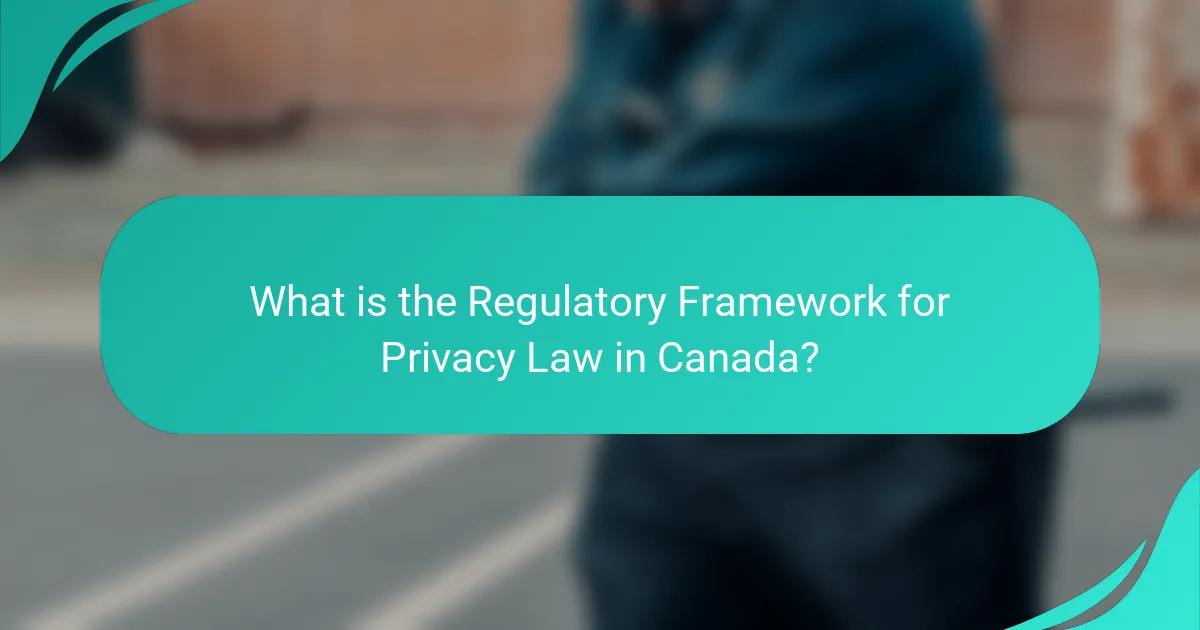
What is the Regulatory Framework for Privacy Law in Canada?
The regulatory framework for privacy law in Canada comprises several key statutes and guidelines. The primary legislation is the Personal Information Protection and Electronic Documents Act (PIPEDA). PIPEDA governs how private sector organizations collect, use, and disclose personal information. It applies to organizations across Canada, except in provinces with their own privacy laws deemed substantially similar.
Provincial laws, such as the Personal Information Protection Act in Alberta and the Freedom of Information and Protection of Privacy Act in British Columbia, also play a significant role. These laws provide additional protections and regulations specific to their jurisdictions.
The Office of the Privacy Commissioner of Canada oversees compliance with PIPEDA. This independent agency investigates complaints and promotes awareness of privacy rights. Additionally, the Digital Charter Implementation Act aims to modernize privacy laws to enhance individuals’ control over their data.
Overall, the regulatory framework is designed to protect personal information while balancing the needs of businesses and the rights of individuals.
What are the main statutes governing Privacy Law in Canada?
The main statutes governing Privacy Law in Canada include the Personal Information Protection and Electronic Documents Act (PIPEDA), the Privacy Act, and various provincial privacy laws. PIPEDA applies to private sector organizations and governs the collection, use, and disclosure of personal information. The Privacy Act regulates how federal government institutions handle personal information. Additionally, provinces like British Columbia and Alberta have their own privacy legislation that complements federal laws. These statutes collectively establish a framework for protecting individuals’ privacy rights in Canada.
How do the Personal Information Protection and Electronic Documents Act (PIPEDA) and other regulations function?
The Personal Information Protection and Electronic Documents Act (PIPEDA) governs how private sector organizations handle personal information. PIPEDA establishes rules for the collection, use, and disclosure of personal data. Organizations must obtain consent before collecting personal information. They must also provide individuals access to their data upon request. PIPEDA applies to organizations across Canada, with some exceptions. It promotes transparency and accountability in data handling practices. Other regulations, such as the Digital Privacy Act, amend PIPEDA to enhance protections. These regulations ensure individuals’ privacy rights are upheld in the digital age.
What role do provincial laws play in the regulatory framework?
Provincial laws play a critical role in the regulatory framework of privacy law in Canada. They establish specific rules and guidelines that govern the collection, use, and disclosure of personal information within their jurisdictions. Each province may have its own privacy legislation that complements federal laws, such as the Personal Information Protection and Electronic Documents Act (PIPEDA). For instance, British Columbia has the Personal Information Protection Act (PIPA), which sets additional privacy standards. These provincial laws can create a more tailored approach to privacy, addressing local concerns and contexts. They also provide mechanisms for enforcement and compliance at the provincial level. This decentralized approach allows for greater flexibility in addressing privacy issues that may arise in different regions. Overall, provincial laws are essential for creating a comprehensive and effective privacy regulatory framework in Canada.
How are privacy rights enforced in Canada?
Privacy rights in Canada are enforced through various laws and regulatory bodies. The Personal Information Protection and Electronic Documents Act (PIPEDA) governs the collection, use, and disclosure of personal information in the private sector. Violations of PIPEDA can result in investigations by the Office of the Privacy Commissioner of Canada (OPC). The OPC has the authority to issue findings and recommendations. Additionally, individuals can file complaints with the OPC regarding privacy breaches. Provincial privacy laws also exist, providing additional protections. Enforcement mechanisms include fines, audits, and legal actions. These frameworks aim to safeguard citizens’ privacy rights effectively.
What mechanisms are in place for individuals to report privacy violations?
Individuals can report privacy violations through several mechanisms established under Canadian privacy laws. The Office of the Privacy Commissioner of Canada (OPC) allows individuals to file complaints regarding breaches of privacy. This can be done via an online complaint form, by mail, or by phone. Each complaint is reviewed and investigated by the OPC.
Additionally, provincial privacy authorities exist in jurisdictions like Alberta and British Columbia. These authorities provide similar reporting mechanisms for privacy violations. Individuals can also seek recourse through the courts if they believe their privacy rights have been violated.
The Personal Information Protection and Electronic Documents Act (PIPEDA) requires organizations to have policies in place to address privacy concerns. This ensures that individuals have a clear path to report issues directly to the organizations involved.
How do regulatory bodies oversee compliance with Privacy Law?
Regulatory bodies oversee compliance with Privacy Law through monitoring, enforcement, and guidance. They establish rules and standards that organizations must follow. These bodies conduct audits to assess compliance levels. They also investigate complaints from individuals regarding potential violations. Regulatory bodies can impose penalties for non-compliance, which serves as a deterrent. For example, the Office of the Privacy Commissioner of Canada has the authority to investigate and make recommendations. This oversight ensures that organizations respect individuals’ privacy rights as mandated by law.
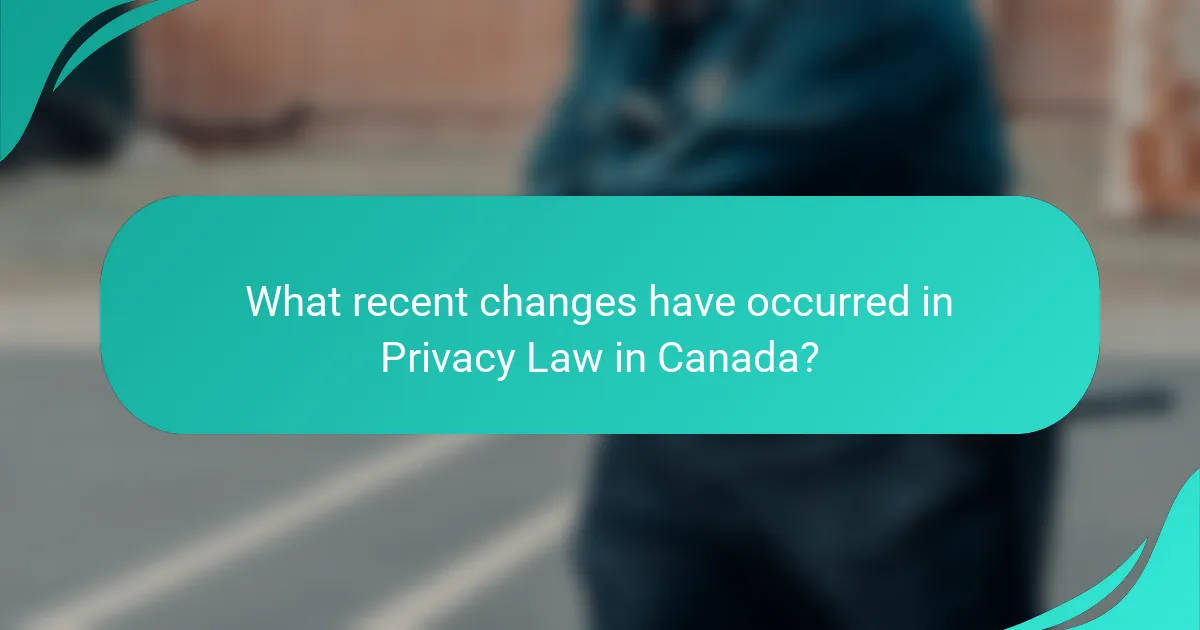
What recent changes have occurred in Privacy Law in Canada?
Recent changes in Privacy Law in Canada include the introduction of the Digital Charter Implementation Act. This act aims to modernize the Personal Information Protection and Electronic Documents Act (PIPEDA). It introduces new provisions for data protection and enhances individuals’ rights regarding their personal information. The act also establishes a new enforcement framework, allowing the Privacy Commissioner to impose fines for non-compliance. These changes reflect a global trend towards stricter privacy regulations. The implementation of these laws is expected to have significant implications for businesses and citizens alike.
What are the significant updates to Privacy Law in recent years?
Significant updates to Privacy Law in recent years include the introduction of the Digital Charter Implementation Act in Canada. This act aims to enhance consumer privacy rights and establish new compliance requirements for organizations. The law introduces the concept of “data portability,” allowing individuals to transfer their personal data between service providers. Additionally, it proposes stronger penalties for non-compliance, with fines reaching up to 5% of global revenue or $25 million, whichever is greater. The updates also emphasize transparency in data handling practices and require organizations to report data breaches promptly. These changes reflect a growing commitment to protect personal information in the digital age.
How do these changes impact businesses and organizations?
Recent changes in privacy law in Canada significantly impact businesses and organizations. These changes require stricter compliance with data protection regulations. Organizations must implement more robust data security measures. Non-compliance can lead to substantial fines, impacting financial stability. Businesses must also invest in training employees on new privacy protocols. Increased transparency is necessary in data collection practices. Consumer trust may improve with enhanced privacy measures. However, adapting to these changes can strain resources, especially for smaller organizations.
What new rights have been introduced for citizens?
New rights introduced for citizens in Canada include enhanced privacy protections and data access rights. These rights empower individuals to control their personal information. Citizens can now request access to their data held by organizations. They have the right to request corrections to inaccuracies in their personal data. Additionally, there are provisions for data portability, allowing citizens to transfer their information between service providers. The introduction of these rights aligns with the evolving digital landscape and privacy concerns. These changes are part of the broader updates to the Privacy Act and related legislation.
Why are these changes important for citizens?
These changes are important for citizens because they enhance the protection of personal information. The recent updates to privacy laws in Canada aim to strengthen individual rights regarding data usage. Citizens will benefit from greater transparency about how their data is collected and used. Enhanced consent requirements ensure that individuals have more control over their information. Additionally, these changes introduce stricter penalties for non-compliance, which encourages organizations to prioritize data protection. Improved privacy safeguards can lead to increased trust in digital services. This trust is essential for fostering a secure online environment. Overall, these changes empower citizens to better manage their personal information.
How do recent changes enhance individual privacy rights?
Recent changes in privacy law enhance individual privacy rights by introducing stricter regulations on data collection and consent. These changes require organizations to obtain explicit consent before collecting personal data. Additionally, individuals now have the right to access their data and request its deletion. The new regulations also impose heavy fines for non-compliance, incentivizing organizations to prioritize privacy. For instance, the Personal Information Protection and Electronic Documents Act (PIPEDA) amendments strengthen protections for sensitive information. These amendments reflect a growing recognition of the importance of privacy in the digital age. Overall, these changes empower individuals with greater control over their personal information.
What challenges do citizens face in understanding these changes?
Citizens face several challenges in understanding changes to privacy law in Canada. One major challenge is the complexity of legal language used in regulations. Many citizens lack legal expertise, making it difficult to interpret the nuances of the law. Additionally, frequent updates to privacy laws can create confusion. Citizens may struggle to keep up with these changes and their implications.
Another challenge is the lack of clear communication from regulatory bodies. Information may not be presented in an accessible manner. This can hinder citizens’ ability to grasp their rights and responsibilities under new laws. Furthermore, the rapid pace of technological advancements complicates understanding. Citizens may find it hard to relate legal changes to their everyday digital experiences.
Finally, misinformation can spread easily in the digital age. Citizens may encounter conflicting information about privacy rights. This can lead to misunderstanding and mistrust of regulatory intentions. These factors collectively contribute to the challenges citizens face in comprehending privacy law changes in Canada.
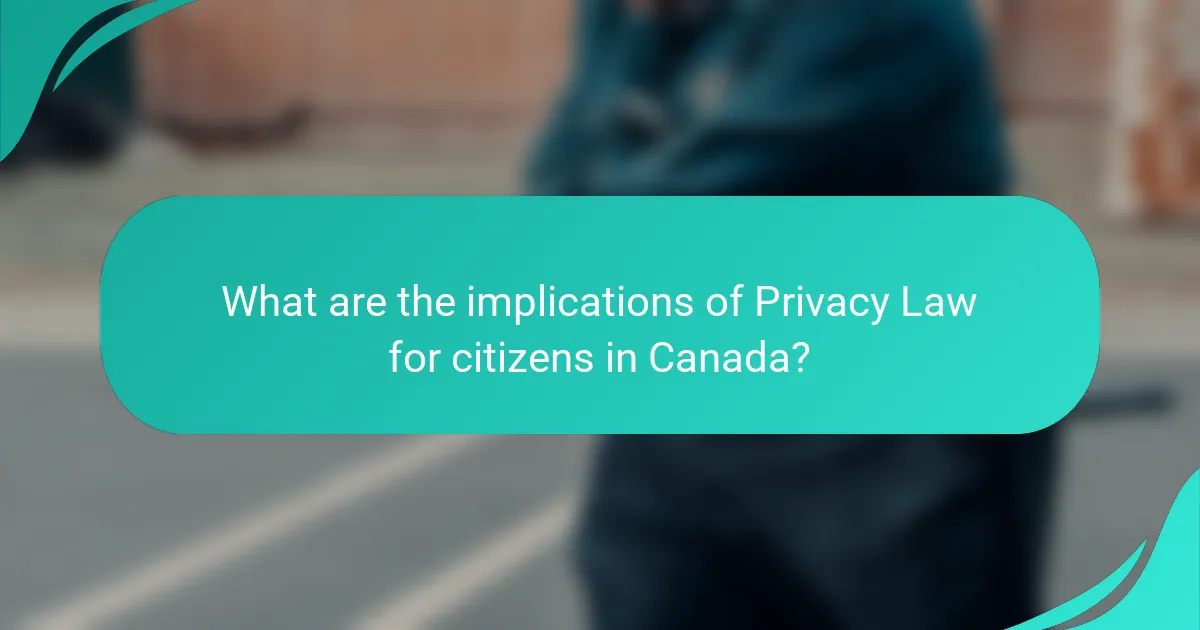
What are the implications of Privacy Law for citizens in Canada?
Privacy Law in Canada provides citizens with rights regarding their personal information. It mandates that organizations must obtain consent to collect, use, or disclose personal data. Citizens have the right to access their information held by organizations. They can request corrections to inaccurate data. The law also imposes obligations on organizations to protect personal information from breaches. Non-compliance can result in significant penalties for organizations. The implications include increased transparency in data handling practices. Citizens are empowered to make informed decisions about their privacy. This legal framework enhances trust between citizens and organizations.
How does Privacy Law affect everyday life for Canadian citizens?
Privacy law significantly impacts everyday life for Canadian citizens by regulating how personal information is collected, used, and disclosed. These laws ensure that individuals have rights over their personal data. For instance, citizens can access their data held by organizations and request corrections if necessary. The Personal Information Protection and Electronic Documents Act (PIPEDA) governs these practices, mandating consent for data collection. Violations of privacy laws can lead to penalties for organizations, promoting accountability. Additionally, privacy laws foster trust between citizens and businesses, enhancing consumer confidence. Overall, privacy law shapes interactions in digital and physical spaces, influencing how Canadians engage with services and institutions.
What are the practical implications for personal data protection?
The practical implications for personal data protection include enhanced privacy rights for individuals. These rights empower citizens to control their personal information. Citizens can request access to their data held by organizations. They can also demand corrections to inaccurate information. Organizations must implement stronger security measures to protect personal data. Failure to comply can result in significant fines and penalties. The regulatory framework encourages transparency in data handling practices. Overall, these implications foster a culture of accountability among organizations.
How can citizens exercise their rights under Privacy Law?
Citizens can exercise their rights under Privacy Law by accessing their personal information held by organizations. They can request corrections to inaccurate data. Citizens also have the right to withdraw consent for data processing. They can file complaints with privacy regulators if their rights are violated. Additionally, citizens can seek damages for breaches of privacy. The Personal Information Protection and Electronic Documents Act (PIPEDA) outlines these rights in Canada. Organizations must comply with these rights to protect individual privacy.
What best practices should citizens follow to protect their privacy?
Citizens should follow several best practices to protect their privacy. First, they should use strong, unique passwords for each online account. This reduces the risk of unauthorized access. Second, citizens must enable two-factor authentication whenever possible. This adds an extra layer of security. Third, they should be cautious about sharing personal information on social media. Limiting visibility can prevent identity theft. Fourth, citizens should regularly update their software and devices. Updates often include security patches that protect against vulnerabilities. Fifth, they must be aware of phishing scams. Recognizing suspicious emails can prevent data breaches. Finally, citizens should review privacy settings on their online accounts. Adjusting these settings can enhance control over personal data. Following these practices can significantly enhance privacy protection.
How can individuals ensure their data is handled responsibly?
Individuals can ensure their data is handled responsibly by being proactive about their privacy. They should read privacy policies before sharing personal information. Understanding what data is collected and how it is used is essential. Individuals can limit the amount of personal data they share online. Using strong, unique passwords for different accounts enhances security. Regularly updating software and applications helps protect against vulnerabilities. Individuals should also be cautious about public Wi-Fi networks, as they can expose data to risks. Finally, utilizing privacy settings on social media platforms can control who sees their information. These actions collectively contribute to responsible data handling.
What resources are available for citizens seeking to understand their privacy rights?
Citizens seeking to understand their privacy rights can access various resources. The Office of the Privacy Commissioner of Canada provides comprehensive information online. This includes guidelines on privacy laws and individual rights. Additionally, provincial privacy authorities offer localized resources. Legal aid clinics may also assist with specific privacy inquiries. Non-profit organizations, such as the Canadian Civil Liberties Association, provide educational materials on privacy rights. Workshops and webinars are often hosted by these organizations. These resources help citizens navigate privacy laws effectively.
Privacy Law in Canada encompasses a regulatory framework designed to protect personal information through legislation such as the Personal Information Protection and Electronic Documents Act (PIPEDA) and various provincial laws. The article outlines the key principles of consent, purpose limitation, and data minimization that govern how organizations handle personal data. It also compares Canada’s privacy laws to those in other countries, discusses the implications for citizens, and highlights recent changes such as the Digital Charter Implementation Act, which enhances individual rights and compliance requirements. Additionally, the article addresses how organizations can comply with these laws and the resources available for citizens to understand their privacy rights.
